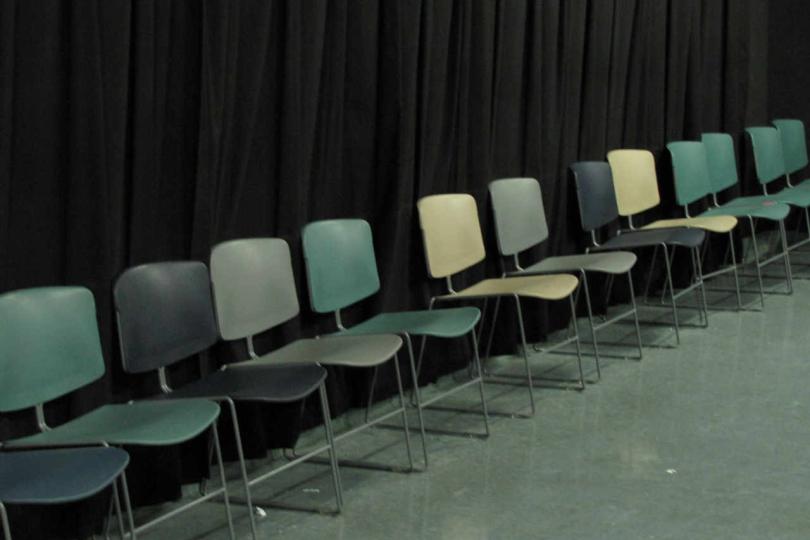Listen to the Experts

My roommate Charlotte and I bought a townhouse back in April because we thought, among other things, how darn much fun it would be to be indebted to a bank for the next thirty years. Somehow it seemed like a better investment than paying rent for nothing until small one-bedrooms on the west side that start going for $2400/month (does anyone really need a lazy river in their apartment complex? …But do you really?).
What we failed to take into account was how little we knew about the actual components of a house. On a recent morning, I woke up and meandered downstairs, then raced back up in a panic because there was condensation around one of the vents (and on all the windows). I realized the humidifier had been running almost 24/7 since I turned the furnace on. I texted my dad in alarm: “What is a humidifier and is it important?” Dad, a pretty decent handyman (he built a full addition onto my parents’ house back in Sioux Falls), told me that I could turn the dial down from seven to three, and that should solve the problem. Also, that humidifiers were for my comfort, and I could turn it off if I really needed to.
I’m a naturally timorous person. I assume I know nothing probably half the time, and would much rather consult an expert on the subject than figure it out on my own (and potentially blow up the house). Unfortunately, last week something happened that made me wish others were as timorous as I.
Last week, my alma mater, a local liberal arts university, chose to cut the theatre arts program due to budget concerns and – as they put it – lack of enrollment in the major. Even after the department professors, the experts, demonstrated a plan to cut costs and keep this program available to students, the decision was made to shut them down. Though no action has been taken yet, and the president’s office is being flooded with emails from incensed alumni, it has affected all of us very deeply.
If alma mater’s leadership had listened to the experts, what would they have heard?
They would have heard that theatre changes lives It truly does. It took a super-sheltered, overconfident, boring, selfish girl and turned her into a woman who understands the pain and sorrow of the world. Who cares about people and cultures beyond her own. Who realized that there is so much outside herself that someday, she can hope to understand. I am a much better person now than I was when I started my theatrical education twelve years ago. As an actor and playwright, I’ve had the opportunity to play and write both saints and sinners, and put aside my own judgments for the benefit of the character. I know how important theatre is, not only for the audience, but for those involved in every aspect of the production.
Ginny, a non-traditional alma mater student and theatre major, was one of those students whose lives were changed by the department. She graduated at sixty, proving it’s never too late to pursue your dream. When reached for comment, she said: “I may have made my living in healthcare, but theatre gave me life! In the collaborative creation of telling compelling stories, both the creators and the audiences explore their humanity in a way unique to the performing arts. The professors nurtured and challenged each student to attain more than they could have imagined. Theatre gives us roots to grow and wings to fly.”
Second, alma mater’s leadership would have heard that theatre and storytelling are essential aspects of our world, and of our humanity. What’s gotten me through the dumpster fire of 2018 so far is hearing stories from amazing women around the world – women who have gone through literal hell – as they hope not only to connect with someone who is going through the same thing, but change the system to prevent it from happening again. As part of my Augsburg Playwriting MFA, I’m studying documentary theatre – theatre about real life created from interviews, court transcripts, government documents, etc. Theatre that shows the world as it is, that doesn’t pull punches, that reveals the best and worst of humanity. There are few – if any – other art forms that articulate personal stories in such a way.
Finally, they would have heard how much of an impact the department has had not only on me, but every student who has walked through the doors of a theatre classroom, stepped into a musical audition, asked to help build sets in the shop, or volunteered to help out in any way they could. Theatre courses teach some of humanity’s most important skills: empathy, communication, thinking on your feet. These skills, often called “soft skills,” are what the greater universe looks for when hiring someone to join their organization. A nursing student could take a theatre course to improve her bedside manner. A business student could participate in a theatre production to improve her improv skills (her ability to think on her feet). A biology student could take a theatre course because he was in theatre in high school and still enjoys it (people are multidimensional, after all). There were over 40 people involved in nearly every alma mater production, most of whom were not majors. But they had the opportunity to improve their skills, to step outside of their comfort zone, to meet new people who loved them and took them in.
Grant, one of those heavily-involved non-majors at my alma mater, said: “I came to [alma mater] seeking an intimate student experience and lifelong practical skills. I found all of this and more in the theatre program. Theatre was simultaneously my challenge and my safe space; a sounding board and where I learned how to listen; where my knowledge expanded but my wisdom was tested; and where I learned about myself by learning about other people. In short, it provided all of the things that make going to school worthwhile. To anyone who asks, I tell them this: my degree may have been in Business, but my education was in Theatre.”
Grant was lucky; for future alma mater students, that opportunity is gone.
I’ve chosen not to name my alma mater in this article because when I think about it, this isn’t about them. Not really. Yes, they were the ones who made a poor decision this week, they were the ones who ignored our passionate and hardworking experts, but history tells us they won’t be the last. So for those of you with alma maters of your own, be they universities or high schools or even middle schools, remind them to listen to the experts. You are the experts. Whether you’re an actor, a stage manager, a lighting designer, or none of the above, you are the expert about how your theatrical education impacted your life. You are the one who can share your story, change the system, and prevent this from happening again.
When I mentioned to my fellow alma mater students that I was writing this article, many more of them had lovely things to say about how their experience with alma mater’s theatre department influenced their life. I would be remiss if I did not include some of them below:
- Brendan, a theatre minor: “The theatre department meant the world to me. Passion for theatre, acting, and storytelling in general has been a driving force in my life for the last 15 years, but I can say without reservation that if my theatre experience in high school or college hadn’t been as special and formative as they were, I would not still be doing it today. Our professors invested in our lives just as much as our education – and still do.”
- Bre, a theatre major: “I learned so many valuable lessons during my time as a theatre major confidence, discipline, how to express myself, how to let go and be in the moment, how to move my body, how to get better at something with practice, that hard work and dedication is just as (if not more) important than talent, how to work/play well with others, and perhaps most importantly, how to step into another person’s world with empathy and understanding. In my current work as a mental health therapist, the ability to be empathetic, present, and engaging in others’ worlds is very important, and I definitely draw on my years in theatre that fostered those qualities in my development.”
- Nathaniel, a theatre major: “[Alma mater’s theatre department] helped form me in amazing ways I can't imagine another school doing. It was an environment where I was free to explore and question but also felt safe to do so. …The skills of creative collaboration, problem-solving, storytelling, rigorous empathy, listening, and all those other things we study and learn in theatre have consistently put me ahead in the workplace.”
So, if there is one thing we can say to alma mater’s theatre department, it is thank you. Thank you for the time and care you invested in us. Thank you for, in many cases, saving us. Thank you for seeing us as individuals, accepting us where we were and taking us beyond what we could have imagined. And most of all, thank you for sharing your love of theatre with us. We wouldn’t be where we are today without you.
(And for those of you still wondering, my humidifier has not turned back on since I turned the dial down. Who knew?)




